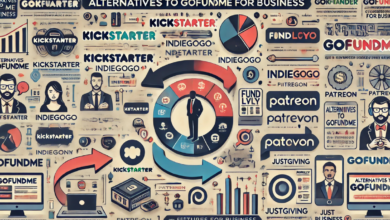Exploring the Best Go Fund Me Alternatives: Top Platforms for Fundraising in 2024

Go fund me alternative has revolutionized the way individuals, businesses, and charities raise money. Platforms like go fund me alternative have become household names, offering an easy way to get financial support for various causes. However, while go fund me alternative is popular, there may be better fitting campaigns due to platform fees, restrictions, or the specific needs of your fundraising project; exploring GoFundMe alternatives is worth considering. This article will deeply dive into some of the best GoFundMe alternatives available in 2024. We’ll also look at key features to consider when selecting a crowdfunding platform and provide insights on choosing the right one for your cause.
Kickstarter: Best for Creative Projects and Startups
Kickstarter is one of the most well-known crowdfunding platforms for entrepreneurs and creatives. Unlike go fund me alternative, which focuses primarily on personal causes, Kickstarter operates on an “all-or-nothing” funding model, meaning the project only gets funded if it meets its financial goal. This feature makes Kickstarter ideal for innovative startups and creative projects like product launches, film production, art, and tech gadgets.
One of Kickstarter’s key benefits is the ability to offer rewards to backers. Creators can offer tiered rewards, such as early access to a product or exclusive content, to incentivize people to contribute more. The platform also provides a global reach, helping project owners attract international supporters. However, the “all-or-nothing” model means if you don’t reach your target, you receive no funding, which can be a downside for campaigns that need partial funds to proceed.
Despite this, Kickstarter remains a strong contender for anyone looking to fund a creative endeavor. The platform’s large community of backers and easy-to-use interface make it a go-to for entrepreneurs and creators who need funding without the constraints often seen on other platforms.
Indiegogo: Flexible Funding for Innovative Ideas
Indiegogo is another popular crowdfunding platform that offers more flexibility than Kickstarter. Like Kickstarter, it’s geared towards creative entrepreneurs, but it stands out with its dual funding options: “Fixed Funding” (all-or-nothing) and “Flexible Funding” (keep whatever you raise, even if you don’t meet your goal). This flexibility makes Indiegogo a versatile choice for projects that need to proceed with partial funds.
Indiegogo is known for its global appeal, allowing campaigns to be funded by people worldwide. It also supports a range of categories, including technology, health, creative arts, and charitable causes. The platform offers extensive tools to help campaigners market their projects, including email templates, social media sharing options, and the ability to run targeted ads.
A significant advantage of using Indiegogo is its emphasis on innovation. Many successful tech projects, such as early-stage gadgets and app development, have gained traction here. However, the platform charges higher fees than some alternatives, so factoring this into your fundraising plan is essential. Overall, Indiegogo’s flexibility and strong marketing support make it a strong personal and professional fundraising contender.
Fundly: Ideal for Personal Causes and Nonprofits
Fundly is a user-friendly crowdfunding platform that caters to a broad spectrum of fundraising campaigns, from personal causes to nonprofit organizations. One of Fundly’s key selling points is that it doesn’t charge platform fees for individual fundraising, which means more of your donations go toward your goal. Instead, Fundly charges a small processing fee for each transaction.
The platform is incredibly intuitive, with easy-to-navigate features allowing campaigners to create and launch fundraisers in minutes. It also supports social media integration, enabling easy sharing of campaigns with friends and family. Fundly is especially useful for personal causes like medical expenses, educational fees, and community projects. Nonprofits also benefit from Fundly’s ability to reach large audiences while keeping fundraising costs low.
However, while Fundly’s simplicity is an asset for some users, it might need more advanced tools and analytics that more extensive campaigns may require. Still, for individuals or small charities, Fundly offers a straightforward and cost-effective solution to raise funds without the complex fees of larger platforms.
GoGetFunding: Lower Fees, More Flexibility

GoGetFunding is a GoFundMe alternative that appeals to those seeking a platform with lower fees and more flexibility. Like GoFundMe, GoGetFunding supports various causes, including medical bills, education, travel expenses, and charity events. One of the platform’s main selling points is its “keep-it-all” funding model, meaning you’ll receive whatever funds you raise, even if you don’t meet your goal.
GoGetFunding also offers personalized support for its campaigners, ensuring you’re aware when creating your fundraiser. The platform charges lower fees than GoFundMe, making it an attractive option for those seeking to minimize fundraising costs. Additionally, GoGetFunding supports global campaigns and offers flexible payment processing options.
While GoGetFunding is easy to use, it has a smaller community than GoFundMe, which may affect how quickly a campaign reaches its financial target. Nonetheless, it’s an excellent option for those who want a straightforward fundraising platform with lower fees and flexible funding options.
Key Features to Look for in Crowdfunding Platforms
When choosing a crowdfunding platform, one of the first factors to consider is the fees. Some platforms, like GoFundMe, charge a percentage of the funds raised, while others charge only transaction fees. If you’re looking for GoFundMe alternatives, compare the costs between different platforms to ensure you’re not losing too much of the funds to the platform itself.
It’s also important to look at the pricing model. Some platforms operate on an all-or-nothing model (like Kickstarter), while others allow you to keep whatever funds you raise (like Indiegogo and GoGetFunding). Understanding these models is crucial because they impact your campaign’s financial strategy.
Ease of Use and Customization
Another essential feature to consider is the ease with which you can create and manage your campaign. A user-friendly interface that allows easy customization is vital to ensure your fundraising page looks professional and resonates with your audience. Platforms like Fundly and GoGetFunding excel by offering simple setup processes and easy-to-use tools for personalizing your fundraiser.
Conclusion
Choosing the right crowdfunding platform can significantly impact the success of your campaign. While GoFundMe is an excellent option for personal causes, its fees and limitations might only fit some people’s needs. Whether you’re raising funds for a creative project, a startup, or a personal cause, platforms like Kickstarter, Indiegogo, Fundly, and GoGetFunding offer viable GoFundMe alternatives catering to various fundraising needs.
Each platform has strengths and weaknesses, so it’s essential to carefully evaluate the options available before launching your campaign. By considering fees, audience reach, and platform flexibility, you can select the best crowdfunding platform for your needs and maximize your fundraising potential.
FAQs (Frequently Asked Questions)
Is GoFundMe the best crowdfunding platform?
GoFundMe is a popular choice, but other platforms like Kickstarter or Fundly might offer more tailored features depending on your goals.
What are the fees associated with GoFundMe alternatives?
Fees vary by platform. For instance, GoFundMe charges 2.9% + $0.30 per transaction, while Fundly offers no platform fees for personal campaigns but charges transaction fees.
Can I keep the funds if my crowdfunding campaign fails?
It depends on the platform. Platforms like Indiegogo allow you to keep funds even if you don’t meet your goal, while Kickstarter does not.
Which platform is best for medical fundraising?
Fundly and GoGetFunding are both excellent choices for medical fundraising due to their low fees and flexible funding models.
How do I market my crowdfunding campaign effectively?
Spread the word using social media, email marketing, and personal outreach. Many platforms provide sharing tools to help with this.
You May Also Read: https://topblogbuz.com/alternative-to-gofundme/





